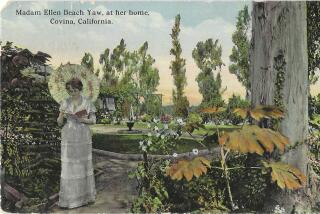MUSIC REVIEW : Arleen Augeer Shows Finesse in Recital
- Share via
Arleen Auger is a paragon. She commands a high, wide-ranging soprano of extraordinary sweetness and purity.
Yet the sweetness never precludes subtlety, and the purity certainly doesn’t come at the expense of sensuality.
She is one of those rare artists who can isolate the essential color and define the fundamental thrust of a piece, virtually with the first sound. Then she goes on in search of the telling nuance.
Her technique reconciles remarkable agility at one extreme, passionate lyricism at the other. She never forces, never distorts.
She is tasteful, refined, sophisticated, and she savors the impact of understatement. Yet she isn’t pallid or unduly reserved on the concert stage. She acts simply, poignantly, with her face and with her voice. She trusts her musical instincts. Even more important, she trusts the composer’s.
She might well be capable of prima donna mannerisms and hard-sell maneuvers. Luckily, she doesn’t need them.
Sunday night at Ambassador Auditorium, the greatest diva ever to hail from South Gate or Huntington Beach offered a model demonstration of vocal savoir-faire and expressive intelligence. Although 20 years have passed since she made her unheralded debut tossing off the top Fs of Mozart’s Queen of the Night in Vienna, she also demonstrated the freshness and ease of a dewy debutante.
She opened her recital--oddly listed as a UK/LA festival event--with some pretty, obligatory nods in the archaic direction of Purcell. This was the time for throat clearing and poise.
In arias from Handel’s “Semele” and “Giulio Cesare,” she reminded the listener that florid indulgences can, and should, be dramatically motivated. The furious resolve of the middle section of Cleopatra’s “Piangero,” for instance, was framed by the exceptionally limpid reflection of the outer movements.
A discerning survey of Mozart’s “Figaro” heroines revealed the soprano first as a nostalgic aristocrat in the Countess’ “Porgi amor,” then as an exquisitely noble ingenue in Susanna’s “Deh vieni non tardar.” For good measure, she added the soubrette perks of “Un moto di gioia,” the alternate aria concocted by Mozart for the same character three years after the premiere.
For bel-canto flight, she luxuriated in the flamboyant poses of Donizetti’s “La zingara,” followed by the ornate rapture of his “Linda di Chamounix.” Every quaver, and every quiver, was in focus.
After intermission, she illuminated five Richard Strauss lieder, summoning exceptional, delicate exultation for the climax of “Standchen.” Dry wit, rhetorical abandon and crystalline diction enriched songs of Frank Bridge and Aaron Copland. Auger’s version of “Why do they shut me out of heaven / Did I sing too loud?” proved more overtly whimsical than Elisabeth Soderstrom’s recent account at the Pavilion.
Lee Hoiby’s sibilant “Serpent” brought the formal portion of the program to a slithering close. It has never seemed so joyful.
The generous encores included a smoldering Habanera vocalise of Ravel, a gently sentimental folk-song setting by Britten, and, in recognition of the Lotte Lehmann centennial, a rhapsodic “Widmung” of Schubert.
Finally, Auger repeated her Greatest Hit: the “Alleluia” from Mozart’s “Exsultate, jubilate,” which she had beamed to the multitudes at the wedding of Prince Andrew and Miss Sarah Ferguson. Even at the close of a strenuous evening, she mustered perfect intonation, a seamless, rippling legato, and a gleaming high C.
Dalton Baldwin, the ever-sympathetic accompanist, tended to play too loud at the outset. One feared he might get shut out of heaven. The problem probably related to the quirky Ambassador acoustic, however, rather than aesthetic priorities.
The patently enthusiastic, strangely reverent audience was reluctant to applaud in mid-group. Awkward silence greeted most internal cadences, even if the selections at hand were patently unrelated.
No matter. A deferred ovation is still vastly preferable to a misplaced ovation--especially in clap-happy Los Angeles.
More to Read
The biggest entertainment stories
Get our big stories about Hollywood, film, television, music, arts, culture and more right in your inbox as soon as they publish.
You may occasionally receive promotional content from the Los Angeles Times.










